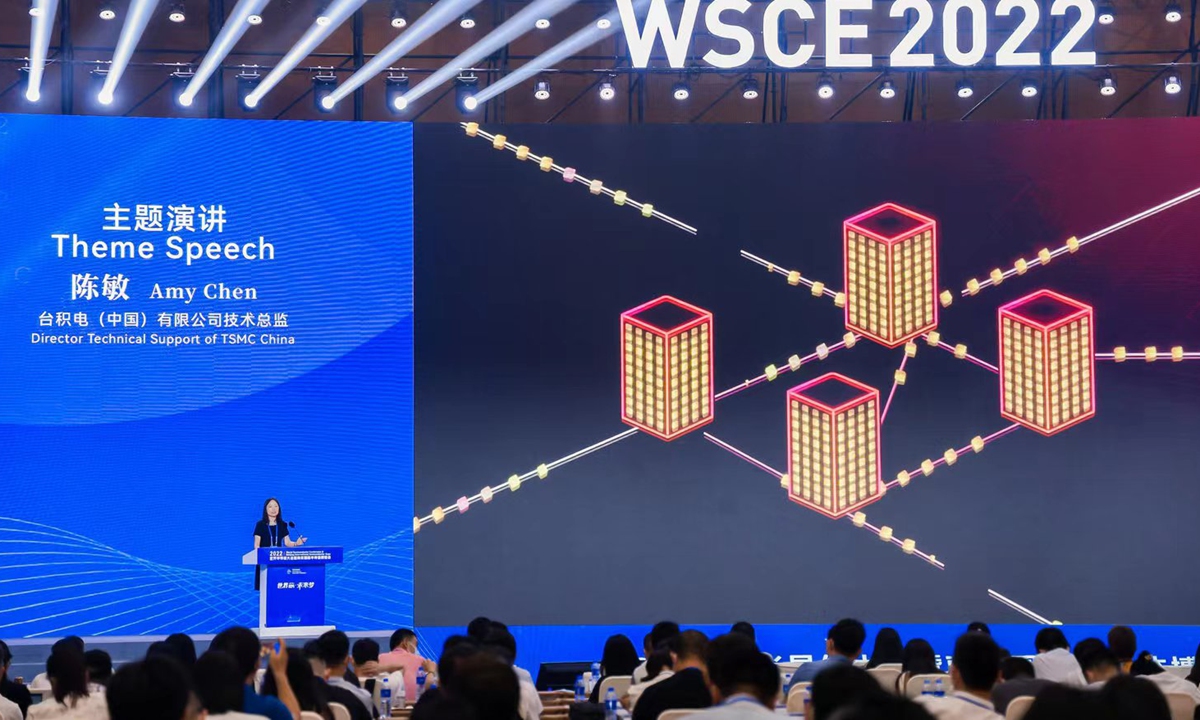Chinese ministry says US chip law violates international trade rules, as industry calls for cooperation

Amy Chen, director technical support of TSMC China, gives a speech at the opening of the World Semiconductor Conference 2022 held in Nanjing, East China's Jiangsu Province on August 18, 2022. Photo: Courtesy of the World Semiconductor Conference 2022
China firmly opposes the US' CHIPS and Science Act, which comes with discriminatory clauses and seriously violates market laws and international economic and trade rules, the Chinese Ministry of Commerce (MOFCOM) said on Thursday, the latest Chinese official response to the US' ill-intended move.
The US law, recently signed by President Joe Biden, has led to a hot debate in the semiconductor field, with many industry players expressing concerns for the bad example that the law has set with regard to the level playing field of the industry, and the potential damage and disruption it will bring to the global semiconductor sector. Industry insiders called for collaboration not confrontation in the field.
The CHIPS and Science Act will provide huge subsidies and tax incentives to the US domestic chip industry, which is a typical differentiated industry support policy, Shu Jueting, a MOFCOM spokesperson, said at an online press briefing on Thursday.
Some of these clauses restrict the normal economic, trade and investment activities of relevant companies in China, and this is obviously discriminatory and seriously violates market laws and international economic and trade rules, which will distort the global semiconductor supply chain and disrupt international trade, Shu further noted.
The US' attempt to draw a "little circle" in the global semiconductor sector has raised widespread concerns among industry players, with many expressing strong opposition to the damaging act.
Responding to the US chip law, the China Semiconductor Industry Association (CSIA) issued an official statement on Wednesday evening, strongly opposing the law and noting that "these provisions clearly deviate from the shared principle of being fair, open and non-discriminatory that the global semiconductor industry forged through practice over the past decades."
On August 9, Biden signed into law the CHIPS and Science Act, which was passed by US lawmakers in July. While the US officials stressed that the legislation is primarily intended to strengthen US semiconductor production, the content of the act shows a clear tendency of cracking down on China's chip industry, such as requiring that recipients do not build certain facilities in China and other countries of concern.
On the sidelines of the World Semiconductor Conference 2022, which is held in Nanjing, East China's Jiangsu Province from Thursday to Saturday, industry representatives noted rising tensions in the semiconductor field since the bill was passed, and called for more collaboration instead of confrontation for sustainable development, especially as the world already suffers from geopolitical conflicts, the COVID-19 pandemic and inflation.
An industry insider who participated in the event told the Global Times on condition of anonymity that "the US chip law is not only another reflection of the country's self-centered and narrow-minded policies but also 'irrational' when it comes to the actual practice."
For example, a smartphone requires hundreds of chips, ranging from radio frequency and Bluetooth chips to integrated SOC, and behind these chips is a global supply chain.
There are also production and transportation cost concerns. For example, many leading chipmakers, including Apple's major contract supplier Foxconn and South Korea's LG, set up production lines in China to be near to the terminal market, industry insiders said.
Christopher Millward, president and managing director of the US Information Technology Office, who was invited to give a video speech at the opening event, said that chip production requires a global effort.
"Products circle the world and pick up attributes at each point along the way until they eventually are recognized as the output of the global supply chain of ideas," Millward said.
China's integrated circuit industry should continue to create opportunities for cooperation with the global industry, while strengthening the development of high-end integrated circuits, Yu Xiekang, vice chairman of the China Semiconductor Industry Association, said at the forum on Thursday.
"We should put more weight on the research and development of chips, while at the same time always insisting on opening up to external cooperation," Yu said.
The global economy is already sluggish due to the pandemic, inflation and geopolitical conflicts, and the global industry chain needs collaboration to achieve win-win outcomes, while the US' "little circle" strategy will create instability for the chip industry chain, the "heart" of many global industries, Ma Jihua, a veteran industry analyst, told the Global Times on Thursday.

